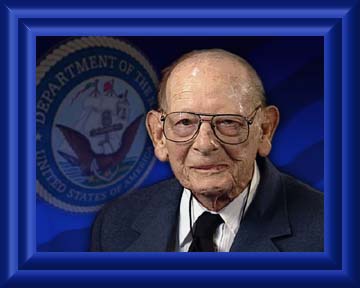|
Para ver este documento
en español, oprima aquí.
Puerto Rico Profile: Admiral Horacio Rivero
February 25, 2000
Copyright © 2000 THE PUERTO RICO HERALD. All Rights Reserved.
 Puerto
Ricans have served valiantly in the United States Armed Forces
for over one hundred years. They fought in all the wars and conflicts
of the last century, and four of them Fernando Luis Garcia,
Euripides Rubio, Carlos James Lozada, and Hector Santiago-Colon
have received the Congressional Medal of Honor. Puerto
Ricans have served valiantly in the United States Armed Forces
for over one hundred years. They fought in all the wars and conflicts
of the last century, and four of them Fernando Luis Garcia,
Euripides Rubio, Carlos James Lozada, and Hector Santiago-Colon
have received the Congressional Medal of Honor.
The story of Puerto Ricans in uniform is not complete, however,
without considering the leadership role that they have
played in defending their country. Many Puerto Ricans have risen
to prominence in the U.S. military, and as high-ranking officers
they have been, and continue to be, vital links in the chain of
command.
Perhaps no one has been more instrumental in setting the stage
for succeeding generations of Puerto Rican military leaders than
Admiral Horacio Rivero. A veteran of World War II, the Korean
Conflict, and even the Cuban Missile Crisis, he distinguished
himself not only for his heroism, but also for his outstanding
intellect and keen decision-making ability.
Horacio Rivero was born in Ponce in 1910, at a time when the
Americans who ruled his native island doubted whether the inhabitants
had the tools necessary to govern themselves. He would spend his
entire career proving the fallacy of that assumption.
The road, however, was not easy. The people of Puerto Rico
attained United States citizenship in 1917. That same year, many
volunteered to fight for the U.S. in the first world war, yet
they were relegated to performing minor tasks in the Panama Canal
Zone.
Only nine years after that "war to end all wars,"
Horacio Rivero received an appointment to the U.S. Naval Academy
in Annapolis, Maryland. On June 4, 1931, Ensign Rivero graduated
from the Naval Academy with distinction, third in his class of
441.
As his naval career continued through the 1930s, Rivero took
advantage of several opportunities to expand his technical knowledge
by continuing his education. He studied electrical engineering,
first at the Naval Postgraduate School in Annapolis, then at the
Massachusetts Institute of Technology, in Cambridge, where he
earned his degree of Master of Science in 1940.
Rivero served throughout the South Pacific in World War II.
His first assignment, in January, 1942, was to assist in outfitting
a new ship, the USS San Juan. Over the next three and a
half years, he acted as a Gunnery Officer and Executive Officer
on a number of ships, including the USS San Juan. He provided
artillery cover for marines landing on Guadalcanal, and he participated
in the capture of the Marshall Islands, Iwo Jima, and Okinawa.
For his service during the war, Rivero was awarded the Bronze
Star with Combat "V," as well as the Legion of Merit.
The second distinction came as a result of Rivero's successful
strategies to save his ship, the USS Pittsburgh, after
its bow had been torn off during a typhoon. Thanks to Rivero's
direction, the ship returned to port without a single life lost.
After the war, Captain Rivero continued to excel in the service
of his country. In the late 1940s and early '50s, he commanded
two ships, the USS William C. Lawe and USS Noble.
He completed the course at the National War College in 1953, and
in 1954 he became Assistant Chief of Staff for Naval Operations.
In 1955, Rivero was promoted to the rank of Rear Admiral, and
he continued to alternate between commanding ships and holding
positions of increasing importance in Washington. By the end of
the Eisenhower Administration, he was simultaneously Deputy Chief
of Staff for Plans and Operations to the Commander in Chief, U.S.
Atlantic Fleet, as well as a member of the Staff of the Commander
in Chief, Western Atlantic Area.
In October, 1962, Admiral Rivero found himself right in the
middle of the Cuban Missile Crisis. As Commander of Amphibious
Forces, Atlantic Fleet, he was on the front line of vessels sent
to the Caribbean by President Kennedy to stop the Cold War from
escalating into World War III.
On July 31, 1964, Horacio Rivero made history. He was the first
Puerto Rican, and the first Hispanic American, to become a four-star
Admiral.
From 1968 until his retirement from the Navy in 1972, Admiral
Rivero was the Commander of Allied Forces in Southern Europe.
After bringing to a close a career spanning six decades, Admiral
Rivero remained in public life as the U.S. Ambassador to Spain
from 1972 until 1975.
Today, Admiral Horacio Rivero lives in San Diego, California.
He was recently named Honorary Chairman of the American Veterans'
Committee for Puerto Rico Self-Determination, an organization
which draws purpose and strength from the great number of Puerto
Ricans who have served in the Armed Forces of the United States.
As Honorary Chairman, Admiral Rivero continues to inspire his
fellow Puerto Ricans to achieve the greatness of which they are
capable.
| 
